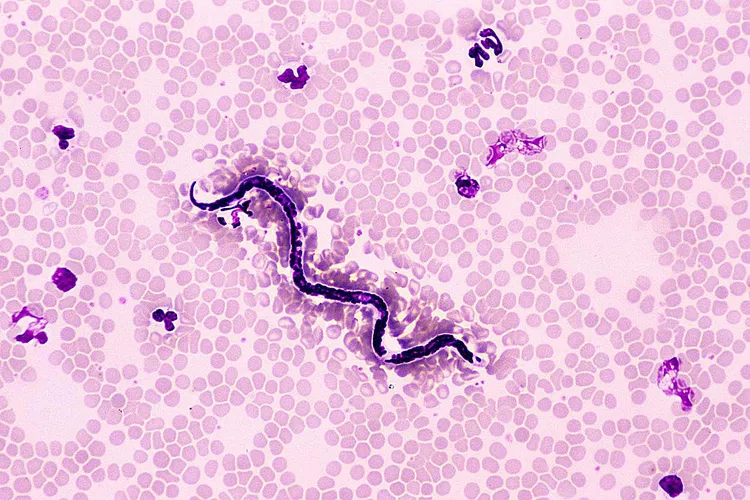
Cat head shaking is often a sign of a medical condition. Whether it's an underlying ear infection or a more serious problem, you'll want to get to the bottom of it quickly so your cat can get some relief. Here are some potential explanations for head shaking in cats and when you should contact your veterinarian.
Cats typically shake their heads when their ears are itchy or painful. The behavior may be frequent or intermittent, and the cat may also scratch their ears. Several medical conditions can cause itchy or painful ears.
Ear infections are the most common cause of head shaking in cats. Caused by an overgrowth of yeast or bacteria, ear infections can cause intense itching and pain. The ears may appear red and contain excess debris or discharge. Sometimes, the ears will have a foul odor.
Ear mites (Otodectes cynotis) are external parasites that are more often seen in cats than in dogs, but they're not especially common in indoor cats. The microscopic mites live and reproduce in the ears, causing intense itching that can make your cat shake their head for relief. It's common to see dark debris inside the ears that may have an unpleasant smell.
Allergies in cats can arise either from contact, inhalation, food, or insects (especially flea bites). These allergies often manifest as intense itching around the head, neck, and ears, and can include head shaking.
Cats can sometimes develop ear polyps, also called feline inflammatory polyps. These are benign growths that originate from the surface of a cat's middle ear, outer ear, or nasal cavity. The sensation of the polyp can cause cats to shake their heads and scratch their ears. Additional signs of a polyp vary depending on where it is located but can include:
Cats, being natural predators, are prone to getting insect bites, mostly on the face and paws. Some cats will have a reaction localized to the site of the bite that can include swelling, inflammation, itching, hives, and also head shaking. Although rare, your cat may experience an anaphylactic reaction, which requires immediate veterinary attention.
It's possible, though rare, for a cat to get foreign material in one or both ears. This is more likely to occur in outdoor cats while they're exploring. Things like seeds, dirt, and foliage can enter the ears and cause irritation or inflammation.
An aural (ear) hematoma, sometimes referred to as "pillow ear," isn't so much a reason for head shaking as it is something that can happen as a consequence of excessive head shaking. If a cat (or a dog) shakes their head hard enough, they can burst the small blood vessels within the ear flap (pinna). The ear flap fills with blood and takes on a puffy, pillow-like appearance.
Don't try to treat excessive head shaking in cats yourself. Over-the-counter ear medications can be ineffective and may even cause side effects such as deafness if the eardrum is damaged. Schedule an appointment with your regular veterinarian to get your cat's head shaking checked out.
There's a difference between head shaking and head tremors (or head bobbing). When a cat shakes their head, it's a deliberate behavior done as a response to itching or discomfort. Head tremors are involuntary and may resemble a subtle seizure. It can appear as if the cat is bobbing their head, or it may look more like trembling. Potential causes of head tremors in cats include:
If you think your cat is experiencing head tremors, see a veterinarian as soon as possible.
Contact your veterinarian if your cat is frequently shaking their head for more than a day or two. The vet will examine your cat and visualize the ear canals using an otoscope. This allows them to look for inflammation and debris and to determine if the eardrum (tympanic membrane) is intact. This step is important as some ear medications can be toxic to the inner ear. Next, they may take samples of ear debris or discharge to look at under a microscope, checking for yeast, bacteria, and ear mites.
If your cat's head shaking is mild and the ears are not red, you can try gently cleaning the ears with a cat-safe ear cleaner. Dampen gauze or cotton balls with the cleanser, then gently wipe away visible debris. Avoid putting liquid directly into the ear unless recommended by your vet. If the eardrum is damaged, liquids can make the problem worse.
Treatment for your cat will depend on the underlying cause of the head shaking and additional exam findings. In many cases, the veterinarian will recommend ear cleaning before using medications.
You may be able to prevent head shaking in cats by keeping their ears clean and bringing your cat to the vet for routine wellness exams. Be sure to contact your vet if your cat is shaking their head as they may be able to identify and treat the problem before it makes your cat very ill.

The First 30 Days With Your New Kitten
The first month is full of changes and excitement for a kitten in a new home. Find out what to expect and what you can do for your new feline friend.
How Old Is Your Cat in Human Years?
As a cat ages, there are often behavioral and physical changes too. Find out how to convert cat years to human years and what to expect at each stage.
What to Buy for Your New Cat: A List of Essentials
Before you bring your new cat or kitten home, there are a number of things to collect or buy so your cat will feel welcomed like a family member.
Human Foods That Are Poisonous to Cats
Many human foods are toxic to cats. Avoid feeding cats table scraps. Instead, feed a nutritious cat food created for their specific nutritional needs.
Cat Food Ingredients to Avoid
When checking the nutrition content of cat food, look for ingredients that are not healthy or show it is of poor quality. Avoid these 3 ingredients.
Should You Feed Your Cat a Raw Diet?
Learn the pros and cons of raw diets for cats, and find out how to choose a raw food diet for your own cat.
Can Cats Eat Corn? Here's What A Vet Thinks
Corn is a common ingredient in cat food and can be a safe treat for cats when fed in moderation. Find out more about how to safely feed corn to your cat.
10 Obscure, Little-known Canine Facts in Honor of National Dog Day
With National Dog Day upon us, it's time to celebrate everything about our favorite pets—even the weirder stuff. Here are 10 obscure facts about dogs you probably didn't know.
The Different Types of Pet-Friendly Workplaces
Discover the different types of pet-friendly workplaces and the benefits they offer employees. Learn how to create a pet-friendly workplace and the best practices for pet owners.
Exploring the Different Types of Pet-Friendly Beaches
Are you looking for pet-friendly beaches? Learn about the different types of pet-friendly beaches, their locations, and tips for visiting them with your pet.
Why Is My Dog Lethargic?
Lethargy can be a sign that something is wrong with your dog. Find out what may be causing this lack of energy and what you should do about it.
Medications to Prevent Heartworm Disease for Dogs
Heartworm disease is a serious risk for all dogs exposed to mosquitos. Find out about the products used to prevent Heartworm disease in dogs.
Can My Dog Eat Tomatoes?
You'll want to keep Fido out of your garden since the tomato plant is toxic, but you can safely offer him ripe tomatoes as a nutrient-packed treat.
15 Best American Cat Breeds
Several cat breeds, including the American shorthair and Bengal, have their origins in the United States. Learn more about these American cat breeds.
Why Do Cats Slap Each Other?
Cats can have some quirky behaviors—one of them being slapping each other. Why do they do this and what can you do to stop it?
Skye Terrier: Dog Breed Characteristics & Care
Learn all about the Skye Terrier, an elegant breed known for its friendly and even-tempered personality with classic terrier traits.
Sloughi: Dog Breed Characteristics & Care
Learn all about the Sloughi, an ancient dog breed known for its impressive running ability, slim stature, and affection toward its family.
English Setter: Dog Breed Characteristics & Care
Learn about the English setter, an excellent hunting breed for pointing and retrieving game. It's also a popular and affectionate companion dog.
Why Dogs Bury Bones and Other Objects
If you give a dog a bone, he might bury it. Why is that? Learn about this burying behavior in dogs and what it means for your pet.
Reasons Why Dogs Run Away and How to Stop It
Dogs can escape, especially if they’re bored and not properly contained. Here are some techniques for stopping your dog from running away.